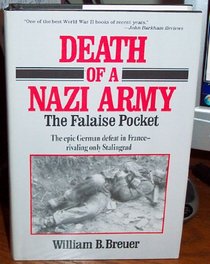The subtitle of this book is somewhat misleading, in that it seems to indicate the book is about the Falaise Pocket. Yet only the last 60 pages of 300 cover that battle. The author actually begins the book just before the capture of St. Lo and spends much of the time covering the breakout at Avranches and Operation Cobra which allowed the breakout.
The author also makes a number of mistakes in his Prologue. Chief among these were the statements that London was under "murderous attack" by German V-1 rockets. While London did suffer from the V-1s, the British used captured German spies to convince the Nazis the rockets were landing too short of London, so the Nazis lengthened the aiming points resulting in most V-1s landing in more rural areas. Despite what the author stated, the V-1s were not faster than any Allied fighters. and the fighters often shot the V-1s down or even tipped the V-1s' wings with their own to send the V-1s crashing into the ground. Plus, Allied leaders were in no way "almost forced" to seek peace to save London, as the author claims on one page, and then reverses himself later on a following page. However, the V-2 rockets which arrived later were faster than allied fighters and did cause significant damage.
Having said all that, the rest of the book is fascinating reading about Operation Cobra, the breakout and the almost complete destruction of two German armies. The author does a very good job of intermixing the experiences of senior commanders with dirty, foot-sore infantrymen and tankers---from both sides.
The author also goes into great detail about some aspects of the campaign, more than often covered elsewhere, including the death of Lieutenant General McNair. In fact, while reading this book, I began to compare it favorably to "The Longest Day" as an engrossing read.
The author also makes a number of mistakes in his Prologue. Chief among these were the statements that London was under "murderous attack" by German V-1 rockets. While London did suffer from the V-1s, the British used captured German spies to convince the Nazis the rockets were landing too short of London, so the Nazis lengthened the aiming points resulting in most V-1s landing in more rural areas. Despite what the author stated, the V-1s were not faster than any Allied fighters. and the fighters often shot the V-1s down or even tipped the V-1s' wings with their own to send the V-1s crashing into the ground. Plus, Allied leaders were in no way "almost forced" to seek peace to save London, as the author claims on one page, and then reverses himself later on a following page. However, the V-2 rockets which arrived later were faster than allied fighters and did cause significant damage.
Having said all that, the rest of the book is fascinating reading about Operation Cobra, the breakout and the almost complete destruction of two German armies. The author does a very good job of intermixing the experiences of senior commanders with dirty, foot-sore infantrymen and tankers---from both sides.
The author also goes into great detail about some aspects of the campaign, more than often covered elsewhere, including the death of Lieutenant General McNair. In fact, while reading this book, I began to compare it favorably to "The Longest Day" as an engrossing read.




